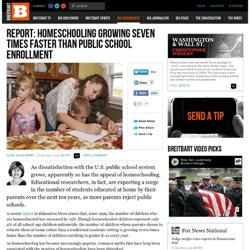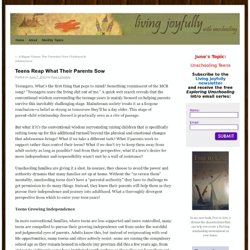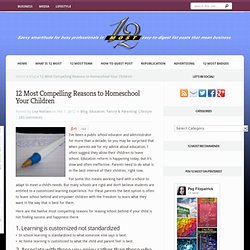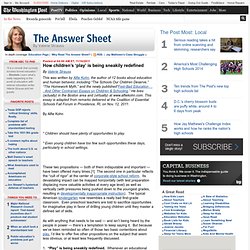

Report: Homeschooling Growing Seven Times Faster than Public School Enrollment. A recent report in Education News states that, since 1999, the number of children who are homeschooled has increased by 75%.

Though homeschooled children represent only 4% of all school-age children nationwide, the number of children whose parents choose to educate them at home rather than a traditional academic setting is growing seven times faster than the number of children enrolling in grades K-12 every year. As homeschooling has become increasingly popular, common myths that have long been associated with the practice of homeschooling have been debunked. Any concerns about the quality of education children receive by their parents can be put to rest by the consistently high placement of homeschooled students on standardized assessment exams.
Data demonstrates that those who are independently educated generally score between the 65th and 89th percentile on these measures, while those in traditional academic settings average at around the 50th percentile. According to the report: Teens Reap What Their Parents Sow. Teenagers.

What’s the first thing that pops to mind? Something reminiscent of the MCR song? “Teenagers scare the living shit out of me.” A quick web search reveals that the conventional wisdom surrounding the teenage years is mainly focused on helping parents survive this inevitably challenging stage. Mainstream society treats it as a forgone conclusion—a belief as strong as tomorrow they’ll be a day older.
But what if it’s the conventional wisdom surrounding raising children that is specifically setting teens up for this additional turmoil beyond the physical and emotional changes that adolescence brings? Unschooling families are giving it a shot. Teens Growing Independence In more conventional families, where teens are less supported and more controlled, many teens are compelled to pursue their growing independence out from under the watchful and judgmental eyes of parents.
How does this look different in unschooling families? Joining Adult Society Pinterest. 12 Most Compelling Reasons to Homeschool Your Children. I’ve been a public school educator and administrator for more than a decade, so you may be surprised that when parents ask for my advice about education, I often suggest they allow their children to leave school.

Education reform is happening today, but it’s slow and often ineffective. Parents need to do what is in the best interest of their children, right now. For some this means working hard with a school to adapt to meet a child’s needs. But many schools are rigid and don’t believe students are entitled to a customized learning experience. For these parents the best option is often to leave school behind and empower children with the freedom to learn what they want in the way that is best for them.
Here are the twelve most compelling reasons for leaving school behind if your child is not finding success and happiness there. 1. . • In school learning is standardized to what someone else says is best. • At home learning is customized to what the child and parent feel is best. Research Center: Home Schooling. How children’s ‘play’ is being sneakily redefined - The Answer Sheet. This was written by Alfie Kohn, the author of 12 books about education and human behavior, including “The Schools Our Children Deserve,” “The Homework Myth,” and the newly published“Feel-Bad Education . . .

And Other Contrarian Essays on Children & Schooling.” He lives (actually) in the Boston area and (virtually) at www.alfiekohn.com. This essay is adapted from remarks delivered at the Coalition of Essential Schools Fall Forum in Providence, RI, on Nov. 12, 2011. By Alfie Kohn * Children should have plenty of opportunities to play. * Even young children have too few such opportunities these days, particularly in school settings. These two propositions — both of them indisputable and important — have been offered many times.[1] The second one in particular reflects the “cult of rigor” at the center of corporate-style school reform. As with anything that needs to be said — and isn’t being heard by the people in power — there’s a temptation to keep saying it. 1. When an adult took standardized tests forced on kids - The Answer Sheet. Update 12/12: QUIZ: Take part of the test that the local school board member took in the story below: Reading Quiz | Math Quiz.

Questions come from the Florida Comprehensive Assessment Test (FCAT) for 10th grade. Update 12/6: Revealed: The school board member who took standardized test Original post: This was written by Marion Brady, veteran teacher, administrator, curriculum designer and author. By Marion Brady A longtime friend on the school board of one of the largest school systems in America did something that few public servants are willing to do. By any reasonable measure, my friend is a success. He called me the morning he took the test to say he was sure he hadn’t done well, but had to wait for the results.
“I won’t beat around the bush,” he wrote in an email. He continued, “It seems to me something is seriously wrong. “I have a wide circle of friends in various professions.